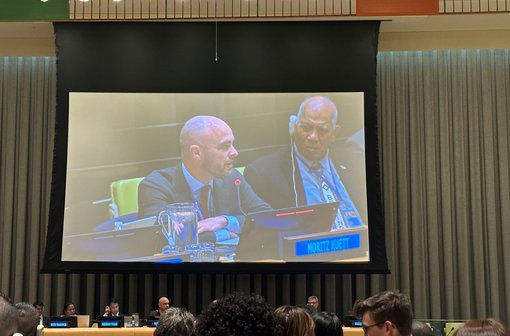In times of multiple crises, European institutions and states are emphasising the EU’s role as a security guarantor for its citizens. The current election campaign for the 2024 European elections is reinforcing this impression. The research project Solidarity through Security? Discourses, Interactions and Practices of European Solidarity in the Field of Security (ZUSE) took a closer look at this development. After three years, the joint project has now been completed.
Over the past three years, the project team has investigated how EU member states and institutions develop ideas of comprehensive security as a guiding narrative of European integration, how this framework translates into interactions and ideas between decision-makers and experts at the administrative level, and how citizens understand the connection between security and solidarity and experience it through local practices, for example in dealing with refugees on the spot. Among other things, the IFSH team analysed extensive EU documents and conducted numerous interviews with administrative actors from the Commission, the Council Secretariat and Member State representations. Among other things, it became clear that the emphasis on a comprehensive promise of protection to European citizens promotes a policy that seeks to safeguard the status quo rather than actively tackle upcoming future challenges, such as climate change, with innovative ideas. It also became clear that overarching security narratives can also permanently change the self-image of administrative actors in the "engine room" of European integration, for example if people in areas such as trade or social policy also recognise security as an essential part of their job description. Everyday interactions and individual contacts, for example in joint working groups, are particularly important for this.
The IFSH researchers have presented their findings at national and international conferences and published them in an article in the journal integration and in an IFSH Policy Brief. Further publications are currently appearing or in progress. In November 2023, the final conference of the project took place at the IFSH Berlin office together with partners and external guests.
The joint project coordinated by IFSH was funded by the BMBF with around €1,200,000 as part of the "Solidarity in Europe" programme. The project was a cooperation with the Helmut Schmidt University/University of the Armed Forces Hamburg (Prof. Dr Teresa Koloma Beck) and the Eberhard Karls University Tübingen (Prof. Dr Thomas Diez). Dr habil Hendrik Hegemann, who also headed the IFSH sub-project, was responsible for coordinating the project. The IFSH team also consisted of Dr Aline Bartenstein and Oliver Merschel. The project was supported over the three years by the research assistants Maria Vitoria Santana Catharino, Lara Islinger and Franziska Wunderlich.






